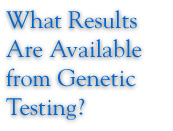|



Search our Site!
|
 |
 |
Wendy Kohlmann, M.S
|
In the past two issues
of the newsletter, we have discussed how genes work and how they are
involved in cancer. This knowledge served as the basis for developing
genetic testing technology to help identify the genetic cause of inherited
conditions in families.
| |
|
 |
| |
The first step in genetic testing involves
getting a blood, or occasionally a tissue sample, and removing
the genetic material from a person's cells. The genetic material
is then analyzed for alterations, called mutations, which
may impair the function of the gene. There are several different
techniques for identifying gene mutations, and the technique
used will depend on the gene that is being studied. Genetic
testing for some hereditary conditions, such as Peutz-Jegher
syndrome is very new and only offered to families participating
in research studies. Genetic testing for HNPCC and FAP is
available through some commercial clinical laboratories as
well as research studies.
|
| |
 |
| |
Only
a small percentage of families with a history of colon and other
types of cancers fit into a pattern that is suggestive of one
of the genetic conditions that have been identified. When a
family has a history that is suggestive of a known inherited
condition, genetic testing is ideally offered first to someone
in the family who has had cancer or appears to be affected with
the suspected condition. This increases the chance of detecting
a genetic mutation if one is present in the family. |
| |
 |
| |
When the first person in a family has genetic
testing, there are three possible outcomes. First, a genetic
mutation may be identified. This is called a positive result.
This result helps to confirm the diagnosis of a specific condition,
and this information can be used to help plan screening and
make surgical decisions. Once a genetic mutation is identified
in one person, genetic testing can be offered to other family
members to determine if they are also at risk.
Second, no genetic alteration is detected.
This is called a negative result, however, this result does
not, however, rule out the possibility of an inherited condition.
Current genetic testing technology may not be able to detect
all mutations. Also, there may be alterations in other genes
that have not yet been identified. Cancer screening is still
important for families who have a negative test result. The
screening recommendations will be based on personal and family
history. When a genetic mutation has been identified in one
family member, other family members can be tested for the
same alteration. If they test positive, they are also at risk;
if they test negative, this means that they have not inherited
the alteration and are not at increased risk.
The third possible outcome is an inconclusive
test result. Sometimes a genetic alteration is identified,
but it cannot be determined if that alteration is responsible
for causing the cancer risk in the family. All people have
variations in there genes. That is why some people have blue
eyes and some people have brown eyes. However, these variations
are just part of what makes us unique and they do not cause
a risk for disease. Further tests may need to be done to determine
the significance of an inconclusive test result, and continued
cancer screening will be recommended for the family.
|
| |
|
|

|
| |
|
| |
 |
| |
Meeting with a genetic counselor is one helpful
way to learn more about your personal cancer risks and options
for genetic testing. Genetic counselors are health care professionals
who specialize in working with families at risk for hereditary
conditions. It is important to have complete information before
making a decision about genetic testing. Some important questions
to ask include:
In addition to learning about the medical
impact of genetic testing, it is also important
to consider how having genetic testing may affect your personal
feelings and the relationships in your family. Receiving genetic
test results may cause many different emotions. Some people
may feel more in control, while other people may feel anxious.
Family members may feel differently about having genetic testing;
some may want to have testing while others may not. Parents
may have concerns about how their genetic test results may
affect their children. Some families may also have concerns
about how the results from genetic testing may affect their
ability to get health insurance.
These are just some of the issues to consider
before having genetic testing. There may be additional issues
specific to the condition in your family. To find a genetic
counselor in your area, contact the National Society of Genetic
Counselors at 610-872-7608 or talk to your physician about
options in your area.
|
| |
| |
|
Back to the Top
|








